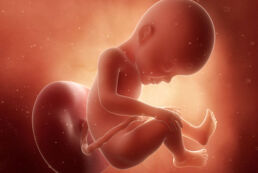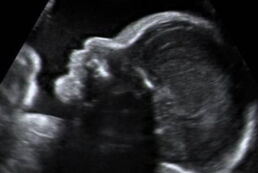Baby's Height and Weight
At the end of the 2nd trimester, i.e. the second trimester, the baby is about 37-38 cm long, the size of a large cauliflower. His/her weight is about 900 grams.
Development of the Baby

The second trimester is the most enjoyable period of pregnancy for many expectant mothers. One of the most exciting developments of this month is that you will meet his little kicks. These movements, which you will feel like the fluttering of a butterfly’s wings at first, will become stronger and stronger day by day. Between 3-6 months covering the 2nd trimester, your baby will have gained about 1 kilogram. During this period, her/his skin is still pink. He/she can put his hands on his/her face and catch anything he’s/ she’s holding.
At the end of this period, the development of organs is largely completed. Bone marrow formation is also accelerating.
“In the lungs, all the equipment that will allow the baby to breathe in the outside world continues to develop at full speed on the way to completion. Thus, in a situation such as preterm birth, there is a chance for the baby to survive with medical help.
A 6-month-old baby (from 24 weeks) is now considered an individual because the likelihood of life risk is reduced.”
Your baby can make various facial expressions, such as surprise, sadness, frowning and smiling, albeit involuntarily.
By the end of this period, the eyes will be in place and will begin to open and close the eyelids.
Thanks to the amniotic fluid, your baby’s developmental stages continue to be completed. This liquid has the task of protecting them against impacts. The baby also breathes by filling and emptying its lungs as it swallows the amniotic fluid. This action is a preparation for her/him breathing after birth. In addition, this fluid keeps the baby’s digestive system working.
The placenta continues to grow with the baby, enabling exchange between the baby and the mother and filtering out carbon dioxide.
Your baby’s thin and pink skin starts to be covered with the vernix layer during this period. This layer, which is as thick as putty, provides temperature control in the baby’s body and facilitates its passage through the birth canal thanks to its slippery structure.
The amount of fat under the skin continues to increase. There are capillaries in the lower layer of the skin. At the top, there are thin hairs called lanugo. The marks on the fingers and toes, palms and soles of the feet are about to complete their formation. Eyebrows, hair and nails continue to form.
By the middle of the second trimester, your baby’s sense of touch is developing even more. Reflex movements are replaced by conscious actions with awareness. Now he/she is more conscious when touching her/his face and holding the umbilical cord!
Towards the end of this period, her sensitivity to sounds is increasing. For example, he/she will start to distinguish between your voice and your partner’s voice. Or it will continue to react by jumping at a sudden sound.
His sense of taste was so fully developed that he could feel bitter, sweet, sour tastes.
Your baby’s genitals develop during this period. Approximately 6 million eggs have been formed in female babies, and this number decreases to 1-2 million at birth. The baby girl’s uterus and vaginal cavity develop this week. Prostate development in male infants is now complete. His testicles have not yet descended from the abdominal cavity into the ovarian bag.
From the middle of this period, a stool called meconium is formed in the intestines. He/she will continue to accumulate these feces in his/her intestines until birth.
Your baby spends some time sleeping during the second trimester. Sleep can last from 20 minutes to 2 hours.
Baby Moves
Your baby is experiencing the most active periods in his/her journey in the womb. He will live in the Trimester. The reason why it is so mobile is both because it enjoys exploring its developing senses and because its space is still large. The amount of amniotic fluid is also quite sufficient for his/her acrobatic movements.
But the number of moves each day may not be the same. You should still be sensitive to this and inform your doctor if your baby does not move at all within 2 days.
Although it moves so much, he/she also creates rest and sleep patterns.
Ultrasound Image

Your baby has now gained the appearance of a tiny human being. In the 2nd trimester detailed fetal ultrasonography, the baby’s body appears proportional.
During this period, your baby still looks a little skinny.
However, despite this scrawny state, you can see that he is very active in your second 3-month ultrasound examination. Because your baby has plenty of space and is very active because their bones and muscles are developing!
You can see on the ultrasound that he/she is holding the umbilical cord. You can also see your baby smiling, sticking out his/her tongue, or grasping his/her face with their hands.
Changes in the Mother's Body
You may experience the following symptoms:
– Varicose Veins
– Haemorrhoids due to constipation and constipation,
– A white discharge from the vagina,
– Leg cramps,
– Burning, indigestion and gas problem in the stomach,
– Itching sensation in your abdomen due to stretching and drying,
– Changes in the abdominal area and skin color on the face,
– Acceleration in heart rate as blood pressure will increase,
– Sometimes your blood pressure rises,
– Headaches and feeling faint,
– Hair growth,
– Rapid growth of hair and nails,
– Nasal congestion,
– Hot flashes and more frequent sweating,
– Dizzy and faint feeling.
– Carpal Tunnel Syndrome causing pricking, numbness, tingling and whining-like sensations in arms, hands and neck area.
In addition; drowsiness during pregnancy also occurs from the first trimester. Our recommendations for a comfortable sleep during pregnancy, You can read it in our article of the 8. month.
When does groin pain begin during pregnancy?
Groin pain during pregnancy can start from the first trimester. As the uterus grows and therefore the ligaments connecting the uterus to the abdominal region stretch, these pains will increase even more. If the groin pain increases excessively and is accompanied by bleeding, you should definitely inform your doctor.
Abdominal pain during pregnancy may also occur from time to time due to enlargement of the uterus. However, if it gets to a level that makes you uncomfortable, you should call your doctor.
Groin pain and abdominal pain caused by the growth of the baby and thus the uterus during pregnancy; It is called Round Ligament Pain. These pains can sometimes be seen on both sides and sometimes on one side.
Pregnancy Glucose Loading Test
If no sugar has been detected in your urine before, and therefore it has not been done before, your doctor may request a sugar loading test that you can have in 24–28 weeks.
Triple or Quadruple Test
In the second trimester, your doctor may ask you for the recommended Triple Test or Quadruple Test between 16-20 weeks. These tests may not be requested in pregnant women who have not been identified with any risk in the Dual Test. Even if the results of the dual test are normal, factors such as the age of the expectant mother and the presence of a potential genetic condition in the family may still require these tests to be performed. If risky situations are detected in the Triple Test or Quadruple Test, the doctor may recommend amniocentesis or other tests to the expectant mother.
2nd Trimester Nutrition Recommendations
If you eat 3 main meals and 3 snacks every day, your blood sugar will not decrease. Your diet, which is rich in protein, calcium, vitamins, zinc, iron, magnesium and all other minerals, is very important for your baby's healthy development and your health. You should definitely not diet during pregnancy.
However, restricting white sugar and white flour foods will be beneficial in terms of not gaining too much weight. Drink plenty of water, at least 8 glasses a day.
During pregnancy, you should eat 2-3 meals a day from protein-containing foods. The amount of one meal is suitable between 85-100 grams of red meat or chicken, 150 grams of fish, 30-60 grams of cheese and 125 grams of dried legumes.
Since the baby's thyroid gland develops during these weeks, do not forget to eat iodine-rich foods during pregnancy.
Canbebe on Social Media!
Join our community of mothers and fathers on social media. Be close to caring community, sharing advices between each other on our everyday life with our baby.
